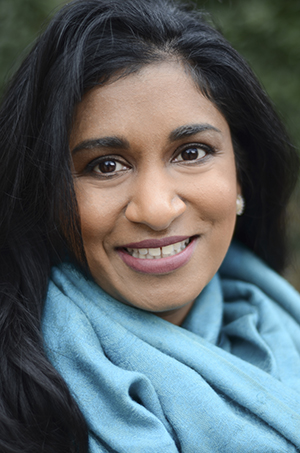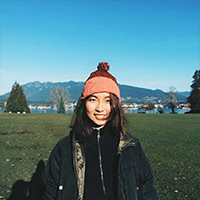Buried Memories: Kelsie Tan in Conversation with Anuja Varghese

Anuja Varghese, whose memoir "Stop Rewind" appears in The Malahat Review's autumn 2019 Issue #208, discusses cultural expectations, academic vs. creative writing, and inspirational queer women of colour in her Q&A with Malahat Review volunteer Kelsie Tan. Read an excerpt of "Stop Rewind."
Anuja Varghese is a QWOC writer based in Hamilton, ON. Her work appears or is forthcoming in Corvid Queen: A Journal of Feminist Folklore & Fairy Tales, So To Speak, Southern Humanities Review, Hamilton Review of Books and others. Earlier this year, she was shortlisted for the Pigeon Pages 2019 Fiction Contest and took third prize in the 2019 Alice Munro Festival Short Story Competition. Anuja holds a degree in English Literature from McGill University and is currently pursuing a Creative Writing Certificate from the University of Toronto while working on a collection of short stories. She can be found on Instagram (@anuja_v) and Twitter (@Anuja_V) or by visiting www.anujavarghese.com.
I find "Stop Rewind" to be a truly haunting piece. Could you say a bit more about why you chose The Lion King in particular to be central to this story about the tragic consequences of an arranged marriage?
It was a little bit haunting to write! It’s a strange family trauma that we don’t speak about, as if by not talking about it, we can erase it from memory and existence. But music has this extraordinary power to pluck the crumpled up and buried memories from the dusty corners of our brains and shove them back up into our throats and eyes so we have to deal with them. Or change the song. Over this past summer, when Disney released its remake of The Lion King, I started hearing the songs from the movie everywhere and they brought me right back to the summer of 1994. The movie and its music in particular are inexorably tied to my experience of the events that transpired, and so it became my way into this story that still quietly haunts my family to this day.
Retrospect plays a large role in “Stop Rewind.” The account is built not only on the differences between a child’s perspective and an adult’s perspective of the same events, but also between different cultural and family traditions. Do you think that writing this story has helped you understand your perspective as a child within these circumstances?
I have spent a lot of time asking myself, why didn’t anyone stop what happened from happening? Why didn’t I stop it? Why didn’t my parents stop it? Why didn’t my sister stop it? I think I probably understand my perspective as a child who was born and raised in Canada, in a middle class home, the most clearly. I had no understanding at the time of how heavy the weight of cultural expectations can be, nor any ability to anticipate or stop their crushing repercussions. If anything, writing about what happened helped me understand some of the other perspectives at play and how the pressures that other members of my family were facing might have led to choices that to me, seemed incomprehensible, but to them, seemed unavoidable. Seeing as I am not close to my sister, my father has passed away, and my mother is not the explaining type, writing this story now, as an adult myself, is sort of the only way I know to seek answers to the questions that linger around these events.
Are there any specific authors or artists that inspire your work as a queer woman of colour?
I’m inspired by voices like Farzana Doctor and Vivek Shraya - I think they’re both telling important, contemporary stories about queer, brown experiences, and examining areas of intersectionality in language that is rich and beautiful, but also completely accessible. I go back and re-read Arundhati Roy all the time, as I keep finding new insights in her words, but I have also been really moved by recent works from Mira Jacob, Kai Cheng Thom, and Dionne Brand. In a broader cultural context, I think Roxane Gay and Lilly Singh are both using their platforms in creative ways to break down barriers for other queer women of colour. All of these artists have influenced my work in some way through the different lenses they have cast on the world in which I live and write.
You hold a BA in English Literature from McGill University and you’re currently pursuing Creative Writing at the University of Toronto. How has your educational journey shaped your current writing interests?
When I came out of McGill, I could write the hell out of a critical essay on Chaucer, but I had become extremely self-conscious of writing creatively. As a young Anglophone woman of colour, either I wasn’t ready for the Montreal literary scene, or it wasn’t ready for me. That being said, I still have great affection for the city and I’m sure things have changed considerably since I was at McGill. More than my academic pursuits, it was my experience of the city itself and the relationships I developed during my time there that have most directly shaped my current writing.
My day job in the non-profit sector has always required me to write, but it wasn’t until I moved to Toronto that the ideas for the collection I’m currently working on started to percolate. And it was almost a full decade later, after moving to Hamilton, that I actually started writing it! Between the School of Continuing Studies at the University of Toronto, where I have found wonderful, supportive instructors like Grace O’Connell, and the wider, diverse community of Toronto writers and literary events, I still feel connected to Toronto in many ways and am so grateful for the learning opportunities that the city continues to offer.
I also recognize that universities are privileged spaces and that there is much to be learned from perspectives and experiences outside of academia. In Hamilton, I have discovered a thriving literary community, and whether through festivals like gritLIT or groups like Jaclyn Desforges’ writing workshops, there are a great many meaningful ways to continue my education outside of a school setting. As I continue growing as a writer and a mother and a feminist and a human, my hope is that my personal journey and my educational journey will work in tandem to reveal the stories I need to tell and help me hone the voice in which I can make them heard.

Kelsie Tan
* * * * * * * *









